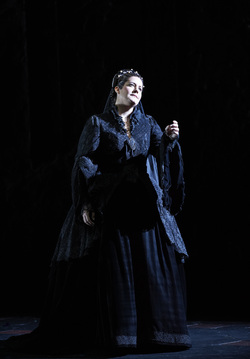
There’s certainly nothing wrong with starting a season with a blood-and-thunder work like Il Trovatore (an “opera-opera” if ever there was one). But rather than mounting a production that seeks to make a strong statement in all ways, the company has delivered a static, stand-and-deliver staging.
Charles Roubaud’s direction seems bereft of dramatic ideas, beyond the most obvious and the least demanding. And it doesn’t help that the sets, by Jean-Noël Lavesvre (rented from l’Opéra de Marseille), are clunky and generic. The result is something that’s neither fish nor fowl. It’s not really a modern re-imagining of the opera – and although Katia Duflot’s drab costumes suggest a setting in Verdi’s own era, the production evokes little sense of historical period.
At the performance I heard (the opera’s third night, on Friday, October 5), Elza Van Den Heever’s Leonora pretty much stole the show. Vocally, she has everything anyone could want from a Verdi soprano: strength, brightness, agility, solid intonation, beautiful phrasing, either sweetness of tone or a dramatic edge (depending on what’s needed), and just enough vibrato to bring every note to life.
Opposite her, as Manrico, tenor Ramón Varga had the vocal power to match Van Den Heever – and their big scene together in Act III was the highlight of the evening. However, I found myself wishing that Varga might find a more varied and nuanced approach to his emotional palette.
Baritone Russell Braun certainly doesn’t lack vocal or musical virtues, but sadly, he seemed miscast as Count Di Luna. The darkness and malevolence that’s needed to make a Verdi villain impressively villainous wasn’t really there – even though he was obviously trying to bring these qualities to the fore.
Mezzo-soprano Eliza Manistina, in the role of Azucena, was a force to be reckoned with. She’s blessed with a penetrating voice – and of all the cast, she was most successful in injecting some dramatic flare into this show. But sometimes her voice did unfortunate things. She has an unusual vibrato in her lower range that can give sustained notes a weird “beating” quality.
The orchestra and chorus sounded great – and conductor Marco Guidarini brought a taut and urgent sense of pacing to the performance.
But dramatically and visually, this Trovatore was stillborn. Fortunately, this production was a rental – so it probably won’t ever be seen in Toronto again.
© Colin Eatock 2012
 RSS Feed
RSS Feed

